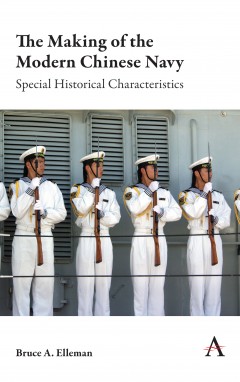The Making of the Modern Chinese Navy
Special Historical Characteristics
By Bruce A. Elleman
Other Formats Available:
- About This Book
- Reviews
- Author Information
- Series
- Table of Contents
- Links
- Podcasts
About This Book
‘The Making of the Modern Chinese Navy’ includes 14 historical case studies that help to illuminate a number of special characteristics of the modern-day Chinese navy. The Chinese Navy embodies a number of special features that modern-day Chinese naval officers perhaps take for granted, including a belief in the Mandate of Heaven, tributary system, and the fear of ‘losing face’ either in a diplomatic setting or by risking valuable equipment in battle. Ethnic and language differences, regional loyalties, and political mistrust potentially exacerbate these problems. Special peculiarities include the Mongol dual-officer diarchy that led to the political commissar system utilized by the People’s Liberation Army. Outside influences, such as blockade, sanctions, and embargoes, can exert a profound impact on China, just as foreign intervention or, equally important, a decision not to intervene, can often determine the outcome of major maritime events.
The 14 case studies discuss many of these characteristics, while the Conclusion examines all case studies together and places them in a historical perspective. Do Chinese still worry about ‘face’, and in particular about ‘losing face’? What impact does the Mandate of Heaven have on modern Chinese? Will Han Chinese on both sides of the Taiwan Strait go to war to determine which dynasty should rule all of China? Does the PLAN worry as much about mutiny as earlier dynasties? What is the impact of foreign intervention, foreign decisions not to intervene and secret diplomacy? ‘The Making of the Modern Chinese Navy’assesses which of these historical characteristics and peculiarities are still present in full force in China and which ones may no longer have as great an impact on the contemporary Chinese navy.
Reviews
“Professor Elleman’s concise and highly readable descriptions of key naval encounters from the tenth through the twenty-first centuries provide admirable historical depth. This book will serve well as a useful overview for non-specialists and as a jumping-off point for readers who hope to explore specific aspects of China’s naval history in greater detail.”
—Harold M. Tanner, Professor of Chinese History and Fellow, Military History Center, Department of History, University of North Texas, USA
Author Information
Bruce A. Elleman is William V. Pratt Professor of International History, U.S. Naval War College, specializing in Chinese history.
Series
Anthem Impact
Table of Contents
Introduction: The Special Characteristics and Peculiarities of China’s Maritime History; 1. Battle of Bạch Đằng River (938); 2. Battle of Yaishan (1279); 3. Battle of Lake Poyang (1363); 4. Ming-Kotte War in Southeast Asia (1410); 5. Ming Loyalists Flee to Taiwan (1661–83); 6. Battle of Chuanbi (1839); 7. Sino-French War (1883–84); 8. Qing Beiyang Fleet’s Defeat in the Battle of the Yellow Sea (1894); 9. Chinese Decision to Sink Nationalist Navy as Blockships (1937); 10. ‘Chongqing’ Mutiny Allowing the PLA to Cross the Yangzi River (1949); 11. The Taiwan Strait Crises (1954–55 and 1958); 12. China’s Decision to Take the Paracel Islands from South Vietnam (1974); 13. Missile Blockade: The Taiwan Strait Crisis (1995–96); 14. The EP-3 Standoff and Diplomatic Resolution (2001); Conclusion: The Influence of History on the Formation of the Modern Chinese Navy; Appendices; Selected Bibliography; Index.
Links
Stay Updated
Information
Latest Tweets



